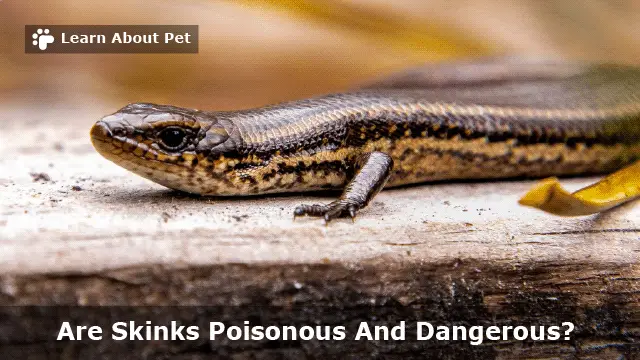When lizard owners want to find new pets, many think that they want to keep skinks but still doubt whether they are dangerous or not. Because the color is bright and looks like it has sharp teeth, many ask the following question.
Are skinks poisonous? In fact, no skink is venomous. If you are being stung or bitten by a skink, it will not be a problem. You can catch them anytime and anywhere you want without having to worry about them biting you. The challenge is that skinks can climb trees and run fast, and you can’t catch them by grabbing the tail because of the defense system in their bodies.
To find out if skinks are dangerous or not, let’s read the article below before you keep them as pets.

Are Skinks Poisonous?
The skink’s bright color makes many people think they are poisonous, just like other animals such as snakes or frogs, but this is not the case. No skink breeds are venomous. They can bite, but their bite contains no venom.
Skinks do bite when they are threatened, although they do so only rarely. Usually, they are only mildly dangerous, although they aren’t necessarily non-toxic or harmless to humans either.
The worst thing possible that could happen is that they bite, but fortunately, there are easy steps you can take to prevent that from happening.
The only potentially dangerous situation is if you have a skink that has sharp teeth and is allowed to continue biting your arm. It is hard to imagine anyone with real strength getting away with this.
Skinks are harmless animals, so it is safe to find them in the wild and make them pets because they are easy to care for.
Are Skinks Dangerous?
Skinks are typically timid animals and will often flee rather than fight back if threatened. That is why they are usually the best choice as pets for children as well as elderly people.
They are very rarely aggressive, although they will still listen carefully to their owners and avoid a fight if one is about to occur.
The risk is very small if you want to make skinks as pets. They do not have powerful limbs, claws, or any defense system that can frighten humans. Skins only use their sharp teeth for biting and are only used as a last resort.
Skinks prefer hiding or fleeing rather than biting humans if you want to find them in the wild. If they’re cornered with nowhere to run, usually skinks will open their mouths or stick their tongue out or hissing to indicate they don’t want to be disturbed.
Do Skinks Bite?
Only on rare occasions. The common garden skink will also only bite if they feel cornered with nothing they can do. Their small sharp teeth are used to catch their prey with a smaller size. If you scare them and bite them, that is the last step they can take.
Are skinks poisonous? Although skinks can bite, their bite does not contain venom, although their bite can be painful.
Ensure you don’t approach them while hissing or sticking out their long tongue because that’s a sign they’re going to bite you. You need to leave them alone until they don’t show this behavior.
Although skinks are not aggressive animals, you still have to be careful when petting them. They can bite when you touch them or pick them up if they feel threatened.
How To Be Cautious To Not Get Bitten By Skinks?
Every lizard has a timing or something that makes them bite you at any moment. Although their teeth are not very well-defined, their bite is also strong and painful. If you’re still asking are skinks dangerous because of their bites, the answer is still no because they don’t do it often.
If you can avoid skinks from biting you, there are a few things that indicate the likelihood that skinks will bite. Let’s look at the table below.
| Reasons | Explanation |
| Don’t want to be touched | When they are stressed or want to be alone, don’t approach or pick them up so you don’t get bitten. |
| Instinct | If you deliberately put your finger in front of their mouth, there is a chance that they will bite because their reflex is to think of your hand as their prey. |
| Hungry | If they haven’t eaten for some time, they may bite out of hunger. |
| Stressed | Nervous or feeling threatened can make a skink bite. |
Are Skinks Poisonous To Dogs?
Skink is not poisonous to dogs, but most lizards carry salmonella, which is harmful to dogs. When eaten, the harmful bacteria will enter your dog’s body through the gastrointestinal tract and be distributed throughout its body.
Some of the bacteria will remain in the dog, but some will go into the animal’s excretory system, where they will accumulate. Over time, this will cause serious illnesses like nausea, vomiting, lethargy, and bloody stools.
How about skink bites to dogs? If a skink does bite a dog, it is still unlikely to be seriously hurt by a skink. While skinks can indeed cause a nasty bite, they cannot inflict any serious harm on dogs.
Are Skinks Poisonous To Touch?
Skinks are not poisonous, even all the skin on his body. Many think the skink’s bright skin is a sign that it’s toxic, but it’s not. When a skink feels threatened, two defense systems are its sharp teeth and tail that can come off and still wiggle for a while to trick predators.
Skinks include lizards that are harmless to humans and suitable for pets, but you will find it difficult to catch them in the wild because of their agile and fast movements.
You need to use bait or tricks to get the skink. After all, their skin is slippery if you hold it directly because they can also stay near slightly wet areas.
Are Skinks Poisonous To Cats?
If your cat just holds the skink or chases them and the cat touches the body, there is nothing to poison the cat.
However, the case will be different if the cat eats the skink it finds in the wild because there is a possibility that the cat is poisoned because the skink can carry parasites that can cause inflammation.
Are skinks poisonous? No, it’s just that we can’t be sure what’s in the skink’s body because there could be dangerous parasites that can infect others if the skink is eaten.
You should still pay attention to other pets if you have a skink. Even though it is not toxic, skinks can still injure other pets because of their sharp teeth. If the skink doesn’t hurt the other pet as much as the cat, there’s a chance that the cat will injure the skink.
Are Skinks Poisonous To Eat?
Skink is not poisonous even though it is eaten, and it’s just that there is the possibility of skink carrying salmonella or other parasites, which can be dangerous if eaten with the skink.
When parasites are eaten, it will cause other pets or children to get sick due to diarrhea, vomiting, or lethargy.
To avoid threats from predators, skinks can only release their body parts, namely their tails, to trick them and escape. The severed tail can still move like life, so predators think they’ve caught the skink and are helpless.
Are Broadhead Skink Poisonous?
Broad-headed skinks are harmless and non-venomous, which can be found in densely vegetated regions. Their weapon is a powerful bite if they are cornered or attacked, although it will only feel nipping at humans.
The broad-headed skink has a glossy body and small scales. They have a lifespan of 8 years if they live in captivity. They prefer to live in decaying trees, rotten logs, leaf litters, and moist soil. You can search some of these locations if you want to get broad-headed skink as pets.
Are Red-tailed Skink Poisonous?
The red-tailed skink is not poisonous, and you will rarely see this skink in the open ground. You can find them in rocks, grass, or leaf litter. They hide under surface objects such as logs or rocks.
The red-tailed skink has a shiny body with cycloid scales and has a tail almost twice the length of the body. Their lifespan is up to 6 years in captivity.
Are skinks dangerous? What is dangerous from the skink is only from its bite. The skin and the whole body are completely harmless.

Are Five-lined Skink Poisonous?
Known as five-lined because you can see the body has five yellow or white stripes from nose to tail. Body colors vary. They are brown, olive, or black. The juveniles have a blue tail, and the male has a larger head than the female.
You can find five-lined skinks in damp forested areas. They can disconnect the colorful tail to escape the pursuit of predators. Five-lined skink is not poisonous even though it also has sharp teeth.
If you want to look for them in moist forested areas, you can look around leaf debris or some areas to bask in the sun. Look for them during the day when their activity is high.
Are Blue Tongue Skinks Poisonous?
Bluetongue skink is not poisonous. They only scare away predators who want to get close by opening their mouths and hissing, suggesting they can also act aggressively. Their teeth can also be used for biting, but more for crushing their food than tearing the enemy apart.
If a blue tongue skink bites you, you may bruise but not break your skin. They will run if they see you for the first time, but if they have met you several times and they don’t see you as a threat, then they won’t run right away.
The blue tongue skink is more likely to be out and about in the evening to avoid hot weather and cooler temperatures than during the day.
Are Ground Skinks Poisonous?
Ground skinks are not poisonous, the same as other types of skinks. Ground skinks will only run or hide if they feel cornered swiftly and swiftly.
If they feel they will be caught, their tail will automatically release and wiggle so that predators stop chasing them and think their tail is a skink that has been caught.
Are skinks dangerous? If you choose ground skinks as pets, they are harmless and non-toxic. It’s just that you have to know when the skink will bite you because their bite is also quite painful.
Look for ground skinks and catch them with a tool such as a basin or net because their bodies are quite slippery if you want to directly hold them with your bare hands.
Are Western Skinks Poisonous?
Western skinks are small and have a smooth-scaled body that is often seen outside for basking in the sun. This reptile is diurnal and is only active in warmer seasons. The western skink is very agile and, with its small body, will be more difficult to hold directly.
Young western skinks also have a blue tail to outwit predators and will darken as they age. Rarely on occasion, they play dead until the predator leaves.
Are skinks poisonous? Western skinks are not as poisonous as the rest of the skink types and only bite if there are no steps they can take to escape.
Are Garden Skinks Poisonous?
Garden skinks or penny lizards are often found in suburban gardens in Auckland or forests in Germany. The common garden skink only has a life expectancy of about three years.
Are skinks poisonous? There is no history of humans being poisoned by garden skinks despite being bitten because their bites also do not contain venom. Their small and sharp teeth are only for crushing prey and will not cause serious injury to humans.
Garden skinks are not suitable to be cared for at home when you have cats because one of the predators that often interfere with garden skinks are cats and birds.
How Can You Tell If A Skink Is Poisonous?
You might be able to see other venomous lizards like snakes or Gila monsters, but not any skink in this world. If there are still questions about are skinks poisonous, you can answer all types of skinks. None of them are venomous.
You can’t tell others that skink is venomous only from the color of the skin or the color of the tongue that is different from the color of the body. Like the color blue or red tail and bluetongue, it has nothing to do with venom.
Is Skink Harmful To Humans?
Skinks include harmless low-risk pets and lizards. The only thing dangerous about the skink is its bite, although it will not cause major injuries to humans.
Skinks also don’t have bad behavior like biting all the time because skinks only bite on rare occasions. Don’t be late to feed them, or don’t let them feel threatened, so they don’t feel cornered and want to bite you.
Make sure you keep an eye on your child if you are near a skink. Even though a skink only has small sharp teeth, it can still seriously injure your child and can be difficult to remove.
Are Skinks Poisonous To Animals?
Skink may carry salmonella, which is dangerous if eaten by other pets, so you need special supervision if you place your pet in a large place and can interact with each other because the parasites can make other pets sick even though the skink is not poisonous.
There is nothing poisonous in all parts of the skin and body of the skink, only parasites in the skink that allow other animals to experience vomiting, lethargy, diarrhea, or nausea.
What Should I Know Before Getting A Skink?
You should know that skinks are agile and fast. They also have slippery bodies if they live in humid places. Skink also has a defense system that will release its tail if it feels cornered or threatened.
Are skinks poisonous? No type of skink is poisonous even though their body color is different from the others. You just have to be careful if they are hissing or opening their mouth because that’s a sign they are ready to bite.
Skinks can climb the trees and hide under rocks or leaves, making them difficult to hold directly to be caught as pets.
Final Verdict – Are Skinks Poisonous
Skinks are not poisonous and only release their tails when predators chase them. The tail will wiggle even though it has separated from its body to outwit predators. There are also several types of skinks with a bright color tail so that predators focus more on the tail.

Skinks have small bodies and fast movements, so you need a way to catch them in the wild when you want to take care of them. Don’t be afraid to hold them right away, but watch out for some signs when the skink is about to bite.
Skink bites also don’t contain venom, but they still hurt and are a little difficult to remove. Skinks rarely bite, so they only do that if there are no options left.

Welcome to Learn About Pet. My name is Rajkumar Ravichandran and I love all pets, travel, and amazing food. I write about my passion and personal experience caring for multiple pets in this blog! ❤️
Post Disclaimer
DISCLAIMER: THIS BLOG OR WEBSITE, "Learn About Pet", DOES NOT PROVIDE YOU WITH MEDICAL ADVICE AND IS NOT A SUBSTITUTE FOR MEDICAL ADVICE. ALWAYS GET IN TOUCH WITH YOUR PERSONAL VETERINARIAN AND USE INFORMATION HERE AS GENERAL ADVICE.
The information, including but not limited to, text, graphics, images and other material contained on this website are for informational purposes only. No material on this site is intended to be a substitute for professional veterinary advice, food recommendation, diagnosis, or treatment. Always seek the advice of your veterinarian or other qualified health care provider with any questions you may have regarding a medical condition or for pet food related questions.







